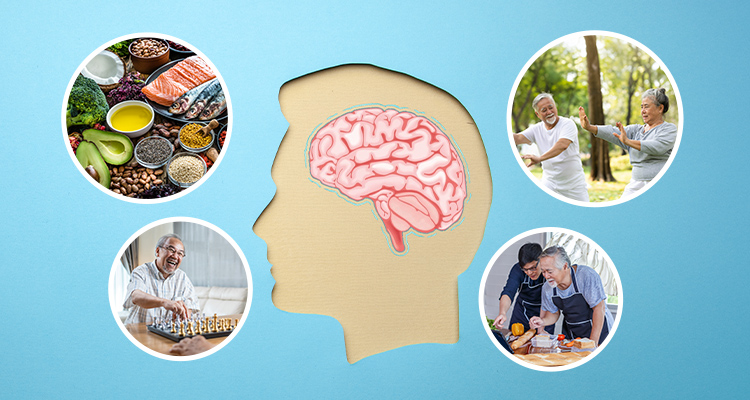Why mental health is important as you get older
A big part of an older person’s general health is their mental health. As people get older, they often face problems, like having to quit, their health changing, losing loved ones, or having less time to spend with friends and family. These changes can have an impact on your mental health, your ability to think clearly, and your sense of belonging. But getting older doesn’t mean that your mental health or happiness will automatically get worse. In fact, later life can be a time of personal growth, thought, and happiness, as long as mental health is taken care of.
Keeping your mental and emotional health in good shape as you get older isn’t just about staying away from mental sickness. It means keeping your mind busy, getting emotional support, and spending time with other people. As late as your 70s or 80s, you can still feel smart, connected, and content if you practice mindful habits and keep a positive attitude.
Challenge and keep the brain busy
The brain needs to work out to stay strong, just like the body. One of the best ways to keep your brain working well is to keep learning. Reading, doing games, playing an instrument, taking online classes, or learning a new language are all things that can keep the brain active and help new nerve links form.
Simple brain games like crosswords, Sudoku, and memory games can help you concentrate and pay attention better. Consistency and change are key. Adding new tasks to mentally enjoyable activities keeps the brain active and able to respond.
Keep your body moving for a healthy mind
Our minds and bodies are deeply linked. By producing serotonin, exercise brings more blood to the brain, which improves memory and happiness. People who work out regularly may even be less likely to develop dementia or sadness or lose their mental abilities.
Seniors can get a lot of mental and physical health benefits from walks, tai chi, yoga, swimming, or even just light exercise. Being busy also helps you sleep better, lowers your stress, and makes you feel more energetic, all of which are important for mental health.
Build relationships and social connections
Being lonely is a big reason why older people have mental health problems. Being alone for a long time can cause sadness, worry, and a faster loss of brain function. Keeping up with friends and family is good for your mental health, even if it takes some work.
Spend time with your neighbors, family, and friends often. You can connect with others in a useful way through phone calls, online chats, community groups, or local events. You can also feel like you belong and are part of a group by joining a club, working, or going to religious or cultural events.
Put your mental health first. As people get older, they may go through emotional changes as they deal with the death of a loved one, changes in their physical skills, or worries about money. It’s important to recognize these thoughts and look for good ways to talk about them.
You can deal with your feelings in a healthy way by writing in a journal, talking to a trusted friend, or seeing a counselor. Being emotionally stable and strong may also be helped by expressing thanks, meditating, or doing spiritual activities. It’s okay to need emotional support; in fact, being honest with yourself is a good way to start building mental health.
How to Effectively Handle Stress
Stress doesn’t go away as you get older; it just changes how it shows up. Taking care of it well is important for both mental and physical health. Long-term worry can make it harder to remember things, concentrate, and can even make you more likely to develop mental problems.
Deep breathing, practicing mindfulness, and gradual muscle relaxation can all help you deal with the stress of everyday life. Taking regular “breaks” from work or school to enjoy music, spend time in nature, or work on a hobby can help clear your thoughts. Having a set schedule with time to rest and unwind also gives you discipline and a feeling of calm.
Eat well to keep your brain healthy
Good nutrition is an important part of staying mentally sharp. Eating lots of fruits, veggies, whole grains, lean meats, and healthy fats is good for your brain and your happiness. For example, the Mediterranean diet has been linked to better brain health and a lower chance of getting less smart over time.
For brain health, foods that are high in omega-3 fatty acids (found in salmon, walnuts, and flaxseeds), antioxidants (found in berries and leafy greens), and B vitamins (found in eggs and lentils) are especially important. Staying hydrated and cutting back on processed foods, sugar, and heavy fats can also help you have more energy and concentrate better.
Get enough good sleep
Not getting enough sleep can hurt your mood, memory, and ability to focus. Older people often have trouble sleeping, but this isn’t a normal part of getting older and should be fixed. Avoiding screens before bed, drinking less caffeine in the afternoon, and sticking to a regular sleep routine are all examples of good sleep habits that can help you sleep better at night.
Talking to a doctor or nurse is important if sleep troubles don’t go away. Not getting enough sleep can make health problems worse and cloud your thinking, which makes it harder to enjoy everyday life.
Look out for signs of depression or loss of brain function
Occasionally being sad is normal, but feeling sad all the time, losing interest in things you used to enjoy, being tired, or pulling away from others may be signs of depression. In the same way, forgetting things once in a while is normal, but loss, confusion, or behavior changes that happen often can be signs of cognitive decline.
If you or someone you know is going through these things, you should get professional help. You can get help for a mental health problem at any age, and things usually go better if you start early. Help is available and can make a big difference, so don’t wait to ask for it.
Do activities that have a purpose
One of the best things for your mental health is having a sense of meaning. Living with a purpose gives people drive, direction, and happiness. Seniors can find meaning in many things, such as taking care of grandkids, helping, teaching younger people, farming, making art, or working on community projects.
The little things you do every day that matter can make you happier, improve your mood, and make life more enjoyable. It’s never too late to find new interests or get back in touch with old ones.
Regular checkups and tests for mental health
Regular doctor trips are important for more than just your physical health. They’re also important for your mental health. Regular checkups allow doctors to spot early signs of sadness, worry, or changes in the way you think and remember things. In general, seniors should get regular checkups and open conversations about their mental health as part of their care.
Talk to your doctor about any changes in your mood, memory, or sleep. Many problems can be fixed or handled well with the right help and treatment, letting you live a fuller, more confident life.
Mental health is a journey that lasts a lifetime
It’s not about avoiding problems as you get older; it’s about making habits, relationships, and tools that help you handle them with strength and grace. To stay linked and smart, you have to do things on purpose, like challenging your mind, taking care of your relationships, staying busy, and asking for help when you need it.
As you get older, you gain knowledge, experience, and a new point of view. Taking care of your mental health gives you the tools to enjoy this part of your life to the fullest—strong in mind, emotionally healthy, and deeply linked to the people and things that matter most to you.




